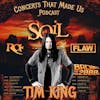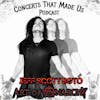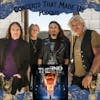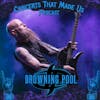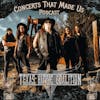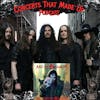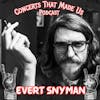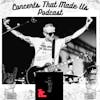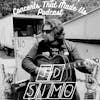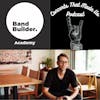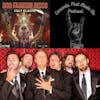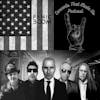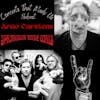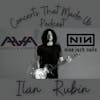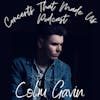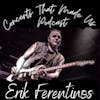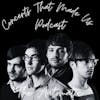From Mariachi Bands to Rock Gods: Steve Ramone's Journey in Music
On this exciting episode of the podcast, Brian is joined by the talented musician, Steve Ramone. Steve shares with us his journey in the music industry and his recently released album, "Chasing Daylight". He delves into the inspiration behind his music and the creative process that went into making the album. Steve also talks about the notable musicians who collaborated with him on the project and how their contributions added to the overall sound of the album.
In addition to discussing his latest work, Steve also opens up about his early experiences with music and how they shaped his passion for it. He shares some of the challenges he faced in finding and keeping musicians in his band, and how he overcame those obstacles to create a successful career in music.
The conversation also touches on Steve's routine before and after a show, and how he measures success as a musician. He shares his thoughts on the importance of connecting with his audience and the satisfaction he gets from seeing people enjoy his music.
As the interview draws to a close, Steve lightens the mood by sharing his favorite musician from history and which musician he would want to spend 24 hours locked in a room with. This episode is a must-listen for anyone interested in the music industry and the creative process behind making an album.
Become a member at https://plus.acast.com/s/concerts-that-made-us.
Hosted on Acast. See acast.com/privacy for more information.
Brian (00:00:03) - Steve, you're very welcome to the show.
*Steve * (00:00:07) - I can't tell you how glad I am to be with you. I appreciate the invitation. I really do.
Brian (00:00:12) - No worries. It's fantastic to to have you here. Now I'm looking forward to getting some insights into your music. So you released the album Chasing Daylight on May 19th. What can you tell us about it?
*Steve * (00:00:24) - It's the combination of, uh, uh, of a lot of, uh, work, a labor of love, uh, between myself and, uh, my, you know, longtime, uh, uh, collaborator, chips enough from the band, enoughs enough. He produced the record, had a lot of great guys playing on it. Um, Joel, uh, you know, Joel Stra from White Snake played a, a couple tracks on it. We had, uh, Dax Nielsen from Cheap Trick played drums on two, three songs in there. We had a, uh, dam Guinness from Ccr R, you know, from C Credence Clearwater came in and did, uh, a couple tracks for us. It's just an amazing time, and it was a, um, and, you know, it just, uh, it, it, it just, it came about so organically and so EAs not easily, because it was a lot of work, but, you know, it seemed like it was destined to happen. So really, really happy with it.
Brian (00:01:12) - Yeah. And, you know, how do you go about getting, getting so many legends to appear on your album? I think you should have called it like Steve's Legends album collection, you know,
*Steve * (00:01:23) - , I appreciate that. We, uh, I grew up with Chip, I grew up with Chip and Donnie. Um, I bought my first guitar from Donnie v when I was, was fifth or sixth grade or something like that. And we all grew up in that, in the same kind of local, uh, uh, local area, which ended up being quite the hotbed for, you know, for music. You know, not only local musicians, but for musicians all over the place, you know? Um, we kind of carried, you know, enoughs enough, and those guys kind of carried on the tradition from Sticks who had come up from that area, and, you know, a bunch of great players there. And, you know, I'm just trying to keep up, man, as, as best I can. .
Brian (00:02:03) - Yeah,
*Steve * (00:02:03) - Yeah. But, but I'm sorry to answer your question. We, we, um, you play enough, you tour enough, and, um, and, and as ridiculous as it sound, COVID Covid helped create those opportunities. Uh, we actually, you know, as ridiculous as it sounds, um, um, uh, Vinny from Sponge was supposed to do a song on the record, and we never got around to it because we ended up ha, you know, having Dan from, from c r come on and, and, and grab that part on Suspicious Minds. And then we were also supposed to have, um, uh, from, uh, sticks, the drummer from Sticks. And, um, uh, he's gonna be so mad at me for not remembering his name right now, but we couldn't, we couldn't, we couldn't fit him e either. So, uh, COVID made a, you know, had a big, uh, to do with that because everybody was available, you know?
*Steve * (00:02:46) - Mm-hmm. , and, uh, and not only that, everybody was dying to play. None of, you know, we do, we all do this because we love to play. I mean, don't get me, I mean, don't think for a second that, you know, I love doing the press and I love talking to everybody, but you don't, I'm sure you know, when, when a band's on the road, they get 45 to an hour and a half every night, every day of, of Bliss, they get that because the rest of it sucks. The rest of it's pretty brutal, man. So, um, we do this because we love it, and a lot of us do this because we have to, literally, because if we don't play music, we go insane, you know? So I just got really lucky and all guys were like, yeah, you got something you want me to play on? Sure. Send it over, man. I'll fly it right back to you. So that's how a lot of that stuff happened.
Brian (00:03:30) - Oh, happy Days. Happy days. And when it came to writing the music, then where'd the inspiration come from?
*Steve * (00:03:37) - I write, I write three to four minute songs about girls that wouldn't go out with me in high school, . That's pretty much it. So I have a wealth, a wealth of to drop, uh, instances drop on where I'll never run outta songwriting inspirations. No, I, I, I, I kind of kid about that. It is the truth. I do like to write Three minute Pops, three to four minute pop songs, but I like to, um, I'd like to layer the lyrics so that there's, you know, double meanings. You can, you can take it as a, as you can take 'em as simple anthems if you want. You can dig into, you know, songs like Sunny Day. And while I Might Be Happy and Bright and stuff, if you actually read the lyrics, you'll, you'll realize it's about, you know, two people that are just completely falling apart and, and, and just not wanting to be around each other anymore. You know? So there's, you know, we, you know, hopefully you bring some, some artistry to the, to the whole pop rock sensibility. Um, you know, I would, I would relate it mostly to get, I, I'm just chasing Dmitri, to be honest with you, . That's what that, that to me, you take pretty, pretty voices like that and, and really masterful songwriting, and you put a little edge to him, and some, and some angst and some and some creativity, man, that's, that, that just does it for me. It really does.
Brian (00:04:49) - Yeah. Yeah. And what do you hope people get from the album?
*Steve * (00:04:57) - You know, I know it doesn't really, it never really works out that way, but I don't know if, if you grew up like this, but I grew up feeling as if there was something, you know, I had feeling as if I had something to give and something to share with everybody if I would only be given the chance and, and given the right environment in which to do it. Mm-hmm. . And that's what this means to me, man. It, it really does. I can walk up to bed. I mean, I, to this day, I can't get ar I couldn't get arrested walking down the street naked in my own hometown, , you know, but I can go to St. Louis and they treat me like, uh, like I'm a, I'm like a rock god or something like that. It's, it's the most ridiculous thing in the world, but really what you're really hoping people get from, from this is, I didn't know he had that in him. Well, number one, I like this, this is good. And I didn't know he had that in him. And I just, and I'm looking at him like differently now, you know, not, not better or worse, not more important or less important, but just from a different artistic perspective. And when people start looking at you like you're an artist, I don't think anything scratches that artistic itch more than that.
Brian (00:06:14) - True, true. Yeah. Yeah. And, you know, it's going to be a very hard album to follow up. How are you even there yet? Are you thinking about it yet?
*Steve * (00:06:24) - ? It's written. It's already written, man. And I, I am so excited about the next patch of songs. Um, I actually, I toured with the London Choir Boys last year. I opened for them all over, all over North America, or all over the United States. Um, and I actually had ups and up as my band, uh, for that, uh, I had to jump on that tour. So Chip and the guys, uh, were my backup band for that, for that thing. But in the middle of that tour, I happened to have this one song that I was kind of a little glitchy on, on lyrics and stuff with. So I was able to sit down with Paul Garron from The Choir Boys, and we finished that song off together, and it's called, uh, she Can't Let Go. And I gotta tell you, man, the next batch of songs are just so, um, they take what we started with, right?
*Steve * (00:07:13) - And they, and they, and they hone those sensi sensibilities a little bit more. Um, it's not a popular record. It's not a, it might be a little bit heavier record in some spots and a little bit lighter record in other spots, but you get both of them. And then we actually came up with another kind of like, um, kind of tranquila kind of song that we're gonna, that we're gonna throw in there as well. So the, the next record, I, I simply can't wait to get back in the studio and, and tidy it up, because, man, I think, and thanks for asking. It's gonna be good. I mean, it's gonna be good. And, uh, and we have the same kind of, we have the same cast of characters, you know, chip will be in, uh, to play, to play bass on most of it. I'll have a lot of my new guys coming in, Eric, Robert, who plays Keys, uh, with, um, with Kingfish out of, uh, out of Nashville, uh, has joined the band permanently now.
*Steve * (00:08:04) - So I'll have him in the studio. Uh, lot of cats that, uh, that are just killing it are, are gonna be out there. And then I've already gotten all those guys. I, uh, you know, I've already gotten, um, you know, Vinny from Sponge and, you know, uh, one of the couple of Sticks guys, and Dax Nielsen has already agreed to play drums on a couple other ones. Joel Stra, we will get him on a couple tracks and stuff. So yeah, we'll take, we'll be able to take, uh, these new songs and, and kind of plug and play the same guys into it, and then hopefully find even a few more. Um, I'm going on tour with, uh, Glen Hughes from Deep Purple and Inve Mounts team in, um, in September. So I'll be on tour with all those guys. I always end up meeting a bunch, bunch of musicians. We always end up, you know, all right, come on, I'll play on yours. You play online and we'll, so yeah, who, who knows what the, who knows who the next players are gonna be, but the songs are there. We have 15 to 20 songs to choose from that we're gonna pick apart and just see, you know, which ones make the great,
Brian (00:09:00) - Oh, man, the anticipation, just to see who's on it now is killing me already. , you need to get it done quick, .
*Steve * (00:09:06) - Yeah, yeah, yeah, yeah. We're, we, we're trying to get the whole things finished up before we hit before we go on tour, just so that we can kind of have it ready
Brian (00:09:14) - Mm-hmm. . Yeah. Yeah. And at this stage, so we'll, uh, dive into your musical history to give the listeners a sense of where you come from. So if you can, now, can you remember your earliest musical memory
*Steve * (00:09:28) - Live or, uh, or, or recorded or what?
Brian (00:09:31) - No, the, the first time you remember kind of taking music in and realizing, you know, that you like it. Yeah.
*Steve * (00:09:38) - There's, uh, I, I have, I, I, I remember being baptized. It's the weirdest thing, right? Um, I wasn't being, I wasn't baptized until I, I think I was like two, two and a half years old. Um, I remember the, the priest yelling at my mom about it. And, and then I remember, remember the music? I remember the church music, and I remember it was a, and, and I remember it was in Key A Mi now that I, you know, I can still think of it. It was a minor, but, um, . Uh, but now that I, uh, I don't know exactly what song it was or anything like that, but, but I remember thinking that that fell really, you know, soft on my ears. And the first time I ever saw Anything Live was, uh, a, a now torn down stadium in Chicago. Um, and it was, uh, by my dad's Mexican.
*Steve * (00:10:24) - So it was, it was, um, it, it, it, the guy came in on a horse, right? It was Mariachi's. The guy came strolling in on a stage on a horse and got up there with the hat and everything. It was Live Mariachi's. It was wonderful. And then my first real live concert that I ever went to. But, but from that, okay, so after that, it's Elvis Presley. Um, by the time I was, I was, you know, I don't know how old, but I know it was 1970 something where Elvis had that, that, uh, uh, live from Hawaii. Oh, yeah. Concert that was simulcast all over the world. I saw that. I went insane. I immediately started badgering my parents for a guitar. I could not get enough of it. I got the record. I wore the grooves out on it. I still, to this day know all the songs I, man, that did it for me.
*Steve * (00:11:11) - Right? So that's when I started playing music. And that, and, and then really what defined a concert experience for me was then going and seeing Bruce Springsteen, um, the Born in the USA Tour. He walked out on stage, just, uh, him harmonica and the band and everything. And, uh, St went into Thunder Road. And then when the whole band came in, and then when that, that sack solo came in at the end with Clarence Clemens, I was like, I sat down . Everybody else was jumping around going, oh my God, this is great. I sat down because something really struck me. I was like, the communication factor between him and the crowd. I was like, oh, mm-hmm. , this is a whole nother level. It's not just the notes you're playing. It's not just the notes that are coming out and hitting your ears. It's the experience, and it's the energy, and it's the transfer of that energy that really matters in this whole dynamic.
*Steve * (00:12:02) - Right? That's when it all settled in. That's when I really understood what it was that I had to do in order to make, in, in order to make that experience myself, you know? Mm-hmm. , because lemme tell you, once you do that, there is no going back, and there's no other, there's no other thing that scratches that ditch. You hear, you hit a note, you get on your guitar and you hear bounce off the wall, you know, in a humongous stadium, and then later that night you hear the same thing. Only it's bouncing off of 10,000 people, 15,000 people . There's no, there's no, there's no replacement for that, you know? Yeah. Yeah. There's no substitute for that. So that, that feeling between you and the crowd is what keeps us coming back. And that's really when I think I came alive. And, and so you asked me, when was the first time in my first musical? Well, I heard music and all those different ex, uh, experiences that I talked about, but I, but I, I listened to it, but I never heard it until that one big concert when it all came near
Brian (00:12:59) - Me. Yes. Yeah. I get, I get you. And, you know, growing up then, in your early years, what was your local music scene like? Was it very vibrant and kind of packed full of great bands?
*Steve * (00:13:10) - I came in, I came in, well, for, I spent as a child, I spent summers in Puerto Rico. So I learned, I, I listened to a lot of salsa merengue and stuff like that when I was in, in, you know, when I was gone for the summers. But when I would come back home, um, I caught, there was this weird thing. I don't know if they, I don't know if it was like this in Europe or anything, but here, the jobbing bands used to play, like, you know, they, they, they'd go in, they'd play the same club for like a week or two weeks in a row, you know? Mm-hmm. They'd all have the same, like, you wouldn't call 'em uniforms or costumes or whatever, but, you know, they'd all dress, you know, like bands and stuff like that, you know, it was, yeah, I came in when I started a gig. I came in just at the end of that. So it's transferring from that to more of a loose kind of, you know, jammy, kind of kind of deal there. So, I, I don't know. And I'm sorry, gimme the, gimme that, what was your question again?
Brian (00:14:02) - So, when you were growing up, your teenage airs and everything, your local music scene, what was it like? Was a very vibrant Oh,
*Steve * (00:14:09) - So there you go. So yes, it was so around here, it was very vibrant, but like I said, it was just starting to end up, and that's what I was getting at it. That scene was just starting to end, and now it was becoming more of a free-for-all, right? Mm-hmm. So it is like, you know, everybody's kind of playing with everybody. And that's when that whole top 40 kind of dance thing kind of started getting in there. And then after that whole dance thing kind of faded, then it was All Rock, right? Mm-hmm. And now you had, you know, that whole nirvana kind of crowd in there. So it was in flux, really. Nothing got to, nothing got to settle in, you know, from the time you went from, from that disco craze to, to that kinda, uh, rock craze, to the kind of, I don't know, that, that metal hair, metal phase, right?
*Steve * (00:14:56) - Yeah. And then you went to grunge, and then you went to kind of more of a techno thing. Nothing got to really stick. And cause of that, the local scene, you know, what the local scene did, it went all 100%, um, not tribute bands. Mm-hmm. . So now, so now it was like a, a Motley Crew tribute, a Van Halen tribute, a a Let's Zeppelin tribute, A thing tribute like that. I didn't really care for that. I don't really wanna do that, man. I just always wanted to play, you know, original music. So now you had that. And then through that finally came the Belmont and stuff like that, you know, the Belmont Streets and stuff like that in Chicago, where all of these cool, very albeit tiny live, um, original music venues started popping up. Mm-hmm. And that's when it started, and that's when it started clicking.
*Steve * (00:15:46) - And that's where you got your Billy Billy Corgan's from, and all those guys and stuff like that, you know? Cause, you know, churches were closing down and turning into venues and stuff like that. We all play, uh, different, different areas like that. And that's when it got really cool. Um, if as it stands right now, it's in flux again, man. It's it, if Covid killed it, there was a lot of, a lot of great things that were happening. A lot of great things. And then Covid just killed it. And it's just now starting to, um, you know, the little green ch shoots are starting to pop out of the dirt.
Brian (00:16:16) - Yeah. Yeah. Well, at least it's starting to come back, you know? And I can't wait to hear about this, your own shows. What are they like for any listeners that haven't caught one, give them the full experience,
*Steve * (00:16:28) - full experiences. Like it's anywhere from a five, or it's either a five or a six piece band, and you'll, uh, no tapes, no, no, nothing. I mean, everything you hear is gonna be, is gonna be played live, and it's gonna come off sounding as if it's gonna come off sounding like Springsteen or Petty or Cou John Cougar on steroids. That's, that's really what it's like, because our guys are monstrous players. So that, that's first and foremost. My, my number one thing. I mean, and, and, you know, chips and Up is gonna be playing bass with me on this tour as well, uh, coming up. So, you know, we're just gonna have, and like I said, it's either, it's either a Top Call Chicago or a Top Call Nashville guy that's, that's in the band. I've recently solidified my, my Rhythm section. So now I'll have the same drummer, uh, and bass player around all the time.
*Steve * (00:17:18) - I'll have the same keyboard player around all the time. So now, and then we're really, really close to solidifying our newest league guitar player who is just a monstrous player and sings like a bird. So the live shows are like, you know, it, it's, we'll do everything that you hear on the, um, on the record, but we'll also do stuff and we'll go some straight up blues, you know, um, stuff like that if we want to. But four piece harmonies, you know, you'll, you, well me, and then you'll have Guy three guys singing as well. So you'll hear straight up harmonies. Again, no tapes, no nothing, no auto tunes, any of that. Just a bunch of guys that can really play, um, out there, just, you know, killing it.
Brian (00:17:56) - Sounds great. Sounds great. You touched on something there about solid solidifying your, uh, lineup. I speak with a lot of musicians from different countries, and I hear from them that, you know, if they're looking for a drummer, the drummer will probably play in at least 10 other bands. You know, it's hard to find people and keep them in your group. What's it like for you?
*Steve * (00:18:19) - It's been a, it's been a labor of love because you get to play with a lot of really good people. But like, my last tour, you know, enough, enough was my band. Um, they've got their own deal. I've got my Deal. Um, it was, it was not sustainable to have them as my band. Somebody's gonna have to tour, turn down some good stuff at some point. So, um, we'd always been fi looking, always been looking, always been, you know, in the background making, you know, relationships and stuff like that. So, so when it finally came time to do that, we had the guys, we knew who, you know, in my mind's eye, I knew who, who, who the cats were that I wanted back there and how it went, you know, really good idea how it sound. And it's funny you mentioned drummers, the drummers, um, it starts with a drummer.
*Steve * (00:18:59) - It really, really starts with a drummer. If you don't get that happy, kind of bouncy vibe, uh, from a drummer, at least for me, I, I love a guy that is this perfect combination between power and touch. I, I gotta have the power, but he also has to have, he also have to, has to be able to nuance the song too, if, you know, if, if it's required, you know mm-hmm. or, uh, and be dynamically, you know, present at all times in order to bring the thing up and down and up and down, and be able to just kind of watch me and know what I'm kind of asking from. You know? And so once you get that, then you kind of got your, you know, you kind of got your leader there that can, that can push the rest of it. But, um, you know, it's, it's great.
*Steve * (00:19:36) - And it's, it's great. And it sucks too, because like you said, you know, somebody else calls up and they got, and they got great stuff to do. Um, you, you can't tell 'em no, you know, what are you gonna do? I was like, I'm, well, I'm not your friend anymore, or something like that. You can't do that, right? Yeah. Yeah. Um, so, so what you do, what you do do is you, I said, do, do what you do is you make, you make, um, you make the environment, you make the experience as great as you can, right? Mm-hmm. . So I try and make the songs as great as I can when they're playing with me. I try and make them as comfortable as I can. Um, I try and be as conscientious and, um, astute a leader as I possibly can be. And I, and then, you know, I, I, I sh I, I pay them, um, what's the word?
*Steve * (00:20:21) - I, I, I pay them equally, which just everybody gets paid equally, you know, it's like the vast majority of times guys get paid more than I do at a show or something like that. It comes out to it, you know? And, and so, and they know that, you know, and, and I'm open and honest with them, and I'm transparent with them, and they know the experience. And so, usually what you can ask of musicians in that, um, situation is that like, look, I understand you got mouths defeat or whatever. So if it's a paying gig that you gotta do, I, I totally understand it. If it's an original gig though, then I expect to be at the very top of your priorities when it comes to original bands that you play with, you know? Mm-hmm. Um, unless you're playing with Motley Crew this weekend, they ask you to join or something like that, then I get that. But otherwise, if Three Jackson and Jill are calling you and telling you, you know, and asking for that particular night, the answer is no. You know? Mm. So that's pretty much how I, how I
Brian (00:21:11) - Well, that's fair enough. That's fair enough. You know, it's not too much to ask and outta all the gigs you've played in your career. So is there one that sticks in your mind as the best experience you've had that maybe you revisit over and over again?
*Steve * (00:21:25) - Yeah. What is the name of that? Um, wow. Um, the Rock and the River Fest in Montana. I've played, uh, guitar with enoughs enough for, um, for two years there, uh, between, um, when, uh, Tony Fennel was, was unavailable. And so there was now in racking the River Fest, so we were opening for, uh, uh, got it. Uh, what's his name? The guy that sings like a bird? Um, uh, it starts with an A, uh, it'll come to me eventually, but, um, but yeah, I mean, playing, like I said, in front of, in front of Alta Bridge, we open for Altar Bridge and, uh, and playing in front of 25,000, you know, which is not only, um, not only that, but just the anticipation that was in the crowd, because they knew, you know, it was, it was us. And then, um, and then Altar Bridge, you know, it was just, it was just magical.
*Steve * (00:22:15) - It was, it was electric. There was that one. And then I played a show at, um, I'm trying to remember the name of the country club here in Illinois, but it was for a festival of some sort. I opened for, uh, Gary Sinise. Um, and they said estimates were about, uh, 30,000 because they had this, they had, it was big outdoor fest. And I, I mean, I could not, we literally could not see, I only had, you know, it was a 35 minute set, but for some reason we walked up there and they loved us. I mean, it was, I, we'd never heard roars like that after a song and stuff. But me, and, uh, me and Paula Drum would turn around. We looked at each other like, all right, well just keep playing. See what happens, you know? But by the end of the set, they were all standing, they were screaming for us. And if you've ever had 30,000 people stand in Roar, man, you can get used to that really quick, man. You can get I so really, really quick. And that was about, you know, I can't remember how many years ago that was, but I think I was still working on a Vegas at that point. And let me tell you, going back to, uh, going back to your day gig, uh, on that following Monday, you're sitting down there and clocking in, don't tell you, it's a humbling experience. ,
Brian (00:23:25) - . I could imagine. I could imagine. Yeah. And to flip it around now, not to get too negative, and without naming names, is there a gig you would consider the worst experience you've had? And how did you deal with it?
*Steve * (00:23:38) - Yeah, , I gotta be honest with you, man, I don't, I, I'm thankful for every last one of them. Yes, I've had, I've had 'em completely go haywire, completely go south. I've had all those, but I wouldn't give up a single one of them. I'll tell you, I'll tell you what, there's, there's spots in Illinois, not in Illinois. There's spots in America where you go, and it's almost as if, you know, time forgot them. And, and it's just like, you know, almost lawless. Um, we played a gig, and this is just last year, we played a gig somewhere in southern mi in Missouri. And, um, we walked in for soundcheck. The place was pretty crowded already, and it's a smoking bar. God, I, I didn't know there were still places you could smoke cigarettes inside Barbara. We walked in and it was just wafting everywhere.
*Steve * (00:24:28) - And I immediately just started shaking my head because I, I, cause I, it was, uh, my it was my guy Josh, who runs the show, who runs the, um, everything for us on the road. He walked in first. He goes, oh no. I go, oh, no, what? I took a breath. I go, and then I didn't say anything cuz I knew, I just started shaking my head. And then as I walk in, all the other band members come walking in, they're like, oh, come on, . It's like, I just knew, shaking my head, I am gonna have to listen to this all night, all day today, all night tonight. I'm gonna have to listen to it on the bus tomorrow. I'm gonna have to listen to it. And it, it's like, I, there's nothing I can do, but just sit here and listen to my band bitch at me about, about having to suck in cigarette smoke all night.
*Steve * (00:25:10) - Oh, man. So that was a, that was a tough one, man. And I tell you what, I did feel like shit the next day, because you're singing, you're sucking in all this air, and then you're, you're going at it. But luckily, I, while we were playing the set, I saw the promoter come walking by, and, uh, and he just gave me the, he just gave me the thing and, you know, walked out. You know, he just handed the check. I know he gave my guy the check and then, you know, just walked out. And I, okay, cool. And I, right then I knew exactly what I was gonna say to the guys. I'm like, never again. We'll never be here again. We'll never work, play with him again. We'll, never. We'll, never. And so I just got, I just went crazy on the whole thing. And then that was kind of enough to get him off my back. ,
Brian (00:25:48) - .
*Steve * (00:25:48) - There you go.
Brian (00:25:50) - And, you know, how do you approach finding gigs and setting up tours then?
*Steve * (00:25:55) - Right now I'm with, uh, I'm working, uh, tentatively with artists worldwide. And they're, they're taking care of tours. And then the, the, the label, um, pavement Entertainment, they help me, they help me with tours and stuff as well. Um, I am looking to redo the way we do, uh, local shows here. Normally, you know, we have local booking agents, or, you know, either it's either Midwest or like West Coast or East Coast and stuff like that. And they'll book you. And I'm completely reconfiguring the way I'm, I'm gonna, I'm gonna do that stuff. And what I've done is we've reached out to, uh, music lawyers and different, and different lo locales, right? Mm-hmm. We get them to represent us at the shows that we want to play. So instead of just like, these guys having these shows, do you wanna play this one? Do you wanna play? No, we're saying, no. These are the shows that we wanna play. Here's our bonafide, you know, so to speak. And then, and then can you make this happen? And, uh, and then we just go from there. So that's kind of how we're doing booking from our perspective.
Brian (00:26:52) - Uh, that's a good way of doing it. And maybe you can't talk about this now, but what kind of antics do you get up to? Look, I
*Steve * (00:27:00) - Didn't know she was no
Brian (00:27:02) - . Oh. But any, uh, I'm sorry, go ahead. Any wild partying, any crazy antics you get up to while on, on, on tour?
*Steve * (00:27:16) - Oh, it still, uh, you know, it still gets a little bit crazy, you know, it can, it's not like it used to be, but I did a tour with the Midnight Devils, and I don't know if you've run across the Midnight Devils. Oh, I have.
Brian (00:27:31) - These guys
*Steve * (00:27:33) - Are insane , and I love every last bit of, I, I love 'em, man. I love them. Uh, we would swap, we would switch nights, you know, one night they would open, the next night I would open, and on the nights that they would open, I would come on stage and I'd be scared, like going, oh man, I gotta bring it tonight. Because, um, I know these guys have been baptized properly already. And sure enough, I'd walk out on their stage and they're all wearing their little glow in the dark things and everybody's, you know, rearing to go. And so, you know, those are the nights you really just, you really just go at it. But, um, Dan, you know, yeah, you're limited in what you can really talk about. I mean, in a, you know, um, I would love to come over to, to, uh, to the UK and get a taste of whatever's in that water over there that, that helps you guys write such great songs, , um, and, and have a couple pints with you and sit around and tell you, cause I, cause we've got some good books,
Brian (00:28:24) - ,
*Steve * (00:28:25) - I just wish I could share
Brian (00:28:26) - privileged information. So ,
*Steve * (00:28:31) - Yeah. Yep, yep, yep.
Brian (00:28:32) - And you know, when it's Showtime, how do you psych yourself up before you go on stage, and then afterwards, how do you wind down?
*Steve * (00:28:40) - So what I, I don't need any psyching up to get to get up on stage. You know, if anything, I, the only thing I do need is a little bit quiet. Um, because if I, if I do, if I get over stimulated when I'm, uh, right before I'm going on, I just can't kind of get in that zone and, and, um, and then I get real kind of, you know, just, I don't know. Um, you get kind of antsy, you know? Mm-hmm. . Um, but, but I love doing this so much, and I, I, I don't get, I never get nervous. I get a little anxious sometimes. Cause I want to get, I get, you know, I'm anticipating the whole thing. I know what we're gonna do. I know what the band's gonna sound like. I know what we're gonna play. I know, I, I know that when we're gonna, I, I mean, we're just confident when we walk out there that we're gonna go kick ass.
*Steve * (00:29:26) - So it's like, I can't wait to deliver the message. You know? I can't wait to get out there and play. So, so what I do is I usually have, um, I usually just have one, one, uh, vodka tonic. Um, and I'll sip that the, uh, half hour before the show and then, uh, water the entire show. And then after the, um, after the show, uh, we, um, I like going directly to the merch booth and, and signing and hanging out and taking pictures and, and just talking with everybody, you know, and doing as much of that as I can. And usually somebody wants to buy me a cocktail. And, and then what I'll do is I'll say, I'll, I'll, uh, I'll, I will have already scoped out, or my guy Josh, will have already scoped out what they have on tap there or whatever. He knows what my favorite bottles of beer are. And, you know, and then I'll have a, have a bottle of beer wrap with everybody, and then it's back on the bus and, you know, you're tired at that point. , I love sleeping. So yeah, I, I, we'll sit around and we'll talk and we'll, uh, we'll shoot the, shoot the shit for a while. And then, um, and then, you know, that bus is, is rumbling down the highway. And man, just that little vibration puts you right to sleep. You sleep like a little baby on that thing.
Brian (00:30:32) - Yeah. Yeah. And you know, the first morning you wake up after a big tour, you're kind of back to reality. You have the post tour blues. How do you deal with it?
*Steve * (00:30:43) - I'll tell you what, man, I got downright depressed after the last tour. I, I, and I'm not even, I mean, I was probably, you know, not clinically depressed, but I was, I was all out of sorts. Everything from your, um, everything from your, you know, your sleep schedule to your, um, uh, just everything, you know, the, the, um, endorphins and everything that, that, that, that, that are surging when you're, when you're playing and you're, and you're constantly sound checking and getting from one spot to the next and solving problems and stuff like that, that when it stops, you can, you know, you can get a little out of it. You can get, uh, and so what I've found is the number one thing you have to do is you have to exercise. You absolutely have to exercise. You have to drink water, and you have to plan, right?
*Steve * (00:31:29) - Mm-hmm. , you have to have plans for what you're going to do when you get home. Because if you can think if, if you think about it, if you, even if you, it means booking a show or two, that following weekend, um, at the local pub, just grab an acoustic guitar and doing an acoustic night somewhere. Mm-hmm. Um, I'll do that. Uh, I'll make sure I get the workouts in my son. And I lo we both love, uh, boxing. We both do jiujitsu. So we get, you know, I got my, my, uh, , my jiujitsu, uh, BJJ shirt on right now. So, so we do a lot of that. And, um, and that's, and that does the trick, but you gotta get right back on the horse. I also found that when you're miserable, those are the best times of the right songs. Nothing makes a good song. Like some Misery
Brian (00:32:13) - , that's a good one. Now, now, all that. Now I haven't heard it before. It's normally like, uh, I get up and I, I go to work or spend time with the family, but that's a very solid plan you have, I imagine like within not so long you'd forget about the bad feelings, you know, and you're just right back into it.
*Steve * (00:32:32) - Yeah, you do. You do. Um, and you know, it's tempered with the, um, the smiles and stuff. You get to see, you get to see the people you haven't seen in a while. You know, you get hugs from the, from the people that you love and, and that you've missed the whole, the whole time. And, you know, it's, um, it's weird because you get depressed on the road sometimes too, if you're, if you don't have enough of that, uh, um, if you don't have enough physical contact with, with the people you love, you know, even talking on the phone's one thing, but, you know, uh, just having them there looking in their eyes and having them smile back at you, you know, that it, it, it means something, you know? Mm-hmm. , it really does. So, um, what you really have to do, honestly, is you have to take stock of your life, uh, when, when you either go on tour or come back from tour, and you have to be willing to, you have to be willing to, to, to say to yourself, all right, there's good and bad in everything, but how blessed am I to be able to do this?
*Steve * (00:33:25) - You know? True. And, and you really have to, you gotta check yourself, is what you gotta do, man. I mean, it's, and I, I just, every time I catch myself trying to victimize myself and making myself into a victim, I automatically just, I just wanna and say, Nope, nope, nope, nope. Take stock. Look at what you're doing. Look at your life. Look at what you have, look at, shut the hell up and find something to do and enjoy. Right? Mm-hmm. . And that's not to say that there are people there with, with issues that need the help, that need professional help, that might need the meds, might need this or that, or whatever. But, um, even though they have fabulous things around them, tho those, those, that pain is real as well. And I, you know, I pray for those people every day. Uh, but, but thank God I'm able to kick my ass out of those situations and just get back to work. Right. And be thankful for what, for what I have.
Brian (00:34:13) - Yeah, exactly. Exactly. And when it comes to your career, how do you measure success
*Steve * (00:34:20) - Streams?
Brian (00:34:21) - measure.
*Steve * (00:34:23) - I measure my success. No. Yeah. Um, I'll tell you, I, I have, I have different ways of measuring it, and I, I'll have different, um, stages of measurement. And right now, the way I measure it is, is, um, is do I have somebody like you to talk to about me, my music check? Do I have a record out check? Am I signed to a label check? Am I, you know, do I have a tour in, in, you know, in store check? Um, do I have albums to push? Yes, I do. And do I have another record to record? Yes. I'm measuring it or I'm measuring it. Like everything's all go right now. Um, the second record's gonna pose a serious, serious challenge because the sophomore blues are real. And, um, and, you know, like you said, I gotta top this. I gotta, I gotta top this thing, right?
*Steve * (00:35:12) - I've gotta, I've gotta, I've gotta bring it. Otherwise they're gonna say up, you know what, he took all the songs that he wrote his entire life, and, you know, he made one good record, and that's it. You know, it's like he was a one trick pony. And, and, you know, I'm not gonna go down that road, you know, I'm, I'm gonna write my rumors. I'm gonna write my, my Rumors album or whatever. Mm. Or my Born to Run album, or whatever album it is, you know, that, that, that defines me. I'm still gonna write that one yet, it hasn't been written yet. So, um, so yeah, that's, that's pretty much where I'm at, man.
Brian (00:35:41) - Brilliant. Brilliant. Before we dive into the last couple of questions, then, future plans. I know you've told us about the album being wrote and the tour coming up. Anything else you want to share with us before we, we dive into the last few questions?
*Steve * (00:35:57) - Um, yeah, there's a, there's . I just popped into my head, man, but I'm doing an initiative. I'm gonna raise, um, I'm gonna raise, I'm gonna raise 10,000 pounds of, uh, of food for my local animal shelter. Um, recently, uh, recently went there and adopted a cat, and oh, over, and I had to, uh, we have two big, gigantic dogs and, uh, you know, we, we love animals and everything, but, um, I went there and I was absolutely, uh, I was absolutely floored at what they have to deal with, the, the amount of misery they have to contend with, and, and they're always begging for food. They're just always, we need food. We know we don't need donations, we need food, we need food, we need food. And, you know, I just felt like I had, I, I, I felt called about to do something.
*Steve * (00:36:44) - Um, I know I need to help my fellow man as well. I, I, you know, I'll do something like that, but, but I just felt like I was put in that position, and I was, I was, I was faced with something that, that that really touched me, and I felt I needed to do something about it. So, so yeah, the, um, the 10,000 pounds of Dog Food Initiative is gonna be popping up on my website, uh, at the end of the week. And I'll make it very easy for you to send, uh, uh, you know, dog food or cat food to either, um, the shelter that I have, or you're local shelter. So, um, oh, brilliant. And because really, I don't care if it's 10,000 pounds it goes to, to that dog in, in the uk or that one over here, down the street in Chicago. Right. So, you know, there's some, there's some, an animal getting fed, and that makes me happy.
Brian (00:37:25) - Brilliant, brilliant. I'll, um, I'll include a link in the show notes for, to make the listener make it easy for the listeners to donate as well.
*Steve * (00:37:33) - Lovely. Thank you.
Brian (00:37:35) - And we'll, uh, we'll dive into the last few then. I've, uh, I've been told that they're kind of increasingly hard, so I'll start off easy on you. If you weren't a musician, what do you think you'd be doing?
*Steve * (00:37:47) - An engineer. I have a degree in network administration. I have, um, a degree in technical management. And, um, and, you know, until all this stuff popped up, I, I was gonna do my, um, I was gonna do my master's in decision analytics at, at, I got accepted to Harvard, so I was gonna, I was gonna do that. Um, and I love numbers. I love crunching numbers. I love, I love tinkering. I love fixing things. I would've been a doctor, but I am, uh, but I am terrible with, with blood, and I'm terrible with, with seeing people in distress mm-hmm. . Um, so it, it keeps me from being able to perform and think and stuff like that. But if I, if I didn't have to deal with that, I would've been a doctor. Um, uh, so engineering is what does it for me. And, uh, solving problems. I love gardening. I can, I mean, my, I I tried to clean 'em as well as I could. Some people wear gloves when they garden. I don't know what the point is. I mean, if you can't, if you can't get your hands into the dirt and feel that mother earth, you know, on your skin, I don't know what the point is, you know? But, uh, that's another thing I could do. I could, I could garden all day. , I swear to God. I could
Brian (00:38:50) - Be, oh man,
*Steve * (00:38:51) - I could be a house husband if I, if I had a wife that just like, wanted to work full-time, like she could work full-time and I would stay home and I would garden and dam it, cook up food and stuff like that.
Brian (00:39:02) - Wouldn't be too bad. Wouldn't be too bad. Yeah. And the next one, so if you could see Annie musician or performer from history in concert for one night only, who would it be?
*Steve * (00:39:15) - It would've to be Elvis Presley. It would, it would, it would, it would have. I mean, it's tough, man, because you got the Beatles there, right? I mean, to see The Beatles or Elvis Presley, or, um, Ray Charles didn't get to see Ray Charles. That one, that one kills me. You know, I would've loved to have seen Ray Charles. Um, I did get to see Prince, that was wonderful, but if I could have been there for that show in Hawaii, um, that Elvis did, I, that's the one that's absolutely the one Beatles, SHA Stadium. I don't know, I don't even think you could hear the music of that one, you know? So I don't know if that's the one I want to go to, but, but yeah, Elvis Presley, um, I don't know, man, there was something magical about him, you know, aside from just being a wonderful entertainer, he delivered the goods.
*Steve * (00:40:00) - His voice is, I mean, listen to it now. It's, it's super, I mean, smooth, it's silk when it needs to be. It's sweet as honey. And it can, you know, it's as edgy as he wants to make it when he needs to be. Listen to him doing Long Tall Sally or, or anything like that, man, he, he, he had it all when it came to the pipes. Yeah. You know, when it came to the singing, he had that down. And I would've loved to have gotten a good upfront look at some of that, you know? Yeah. I did see Paul McCartney on his first, uh, you know, um, uh, on his flowers in the Dirt tour. I had front row center tickets for that. So I got to see him. Oh, man. Lemme tell you, being 10, 10 feet away from McCartney while he sings yesterday with an acoustic guitar, pretty special.
Brian (00:40:46) - I could imagine. I could imagine. Geez. But yeah, I totally agree about Elvis. He is my number one as well. I, I do anything to get, to have got to see him, you know, it was just the whole, the whole package. He had this mystical essence about him as well, didn't he?
*Steve * (00:41:01) - He did. He, he absolutely had that talk about a brand, right? Mm-hmm. , I mean, my gosh, that T c b taking care of business thing. Yeah. And ev and then he's the first one to put together, you know, the bands that, that we're talking about, you know, it's like mm-hmm. . I mean, he had Donald Duck Dunn playing, you know, playing bass. I mean, look up Donald Duck, dun, he played on everything. You know, he had, um, what, what's his face, uh, playing, playing James Burton. Mm. James Burton was his guitar player, you know, I mean, , the guy's a beast. Uh, you know, just so he had, he had guys like that in his band that were just scary, scary, good. And they were a big part of why he was able to just get out there and perform with the confidence he performed with, because he knew he had these, he had this machine behind him that was just running things down, that was just clearing the way for him, you know?
Brian (00:41:49) - Exactly. Exactly. And the next one. So if you had to spend 24 hours locked in a room with any musician from history, who would it be?
*Steve * (00:42:04) - It's, yeah, locked in a room. It's McCartney. Really? It's absolute, it's, oh, uh, I was gonna say Prince for a second there. And I was gonna say, um, uh, and, and then I was also gonna say, uh, what's his face? Uh, I, I, I just brought him up a second ago that, uh, uh, um,
Brian (00:42:23) - Ray Charles. Um,
*Steve * (00:42:24) - Ray Charles. Yeah. But those two guys are so unique, and so, um, there's no writing with those guys, you know? Mm. There's no, they're, they're too, they're, they're just too dominant of force to sit there. Oh, well, hey, prince, how about if you do this, you know, you're not gonna do that. . Yeah. Yo, Ray, how about if you take that piano part? I'm not gonna do that. I'm gonna shut up. Yeah, that's great, Ray. You know, that's it, you know. Um, but McCartney, you can sit down with acoustic guitar, right? So, um, and he's lefty and I'm righty. So his is going that way. Mine's going this way, right? So you're just sitting there looking at each other, and both the sound holes are facing each other, and you're just hearing what, what the other guy's doing, and he's singing and, and you're singing. I think that would be pretty, yeah. 24. Yeah. Absolutely. I I bet, I bet we get a couple good ones out of that session.
Brian (00:43:11) - Definitely. Definitely. It wouldn't get much better than that. Good. The final one. So what song would appear on the soundtrack to your life?
*Steve * (00:43:21) - What song would appear on the soundtrack to my life? It would most likely be we just, it's, it most likely would be Suspicious Minds. That's right. I mean, I got to record it. I was like, I, I, yeah, that's the one man. That's, that's the one. It's got everything, you know, like, um, it's Got the Soul, it's got the, uh, it's got the, um, it's got the lyrics, it's got the, the, the, the shady lyrics and stuff like that, you know, but it's also got the, it's got the release, it's got the, um, you know, it's got that, that ending that comes back and stuff like that, you know? That's a good one. I've never been asked that one before. But yeah, I think, I think if I had to pick that one, it would, it would be something like that. Because I, I gotta tell you, man, it's, um, it doesn't, it, it, sometimes it's not really about what's said. Sometimes it's about the feeling that's being evoked. And I think that's, that's, that would be the one. Yeah.
Brian (00:44:21) - Brilliant. Has to be that one. So listen, Steve, I've really, really enjoyed chatting with you now. It's been an absolute blast. Thanks
*Steve * (00:44:30) - Well, thank you so much. I really appreciate it. Anytime. Uh, anytime you need me, man, I'm here for you. I'd love it if you, uh, you know, could play some of the songs and stuff, that would be wonderful. Really appreciate it. Definitely. And, and God bless you and, and the family, and, and everybody out there in the uk, uh, we're working on something, would love to come out there and, and make something happen soon.
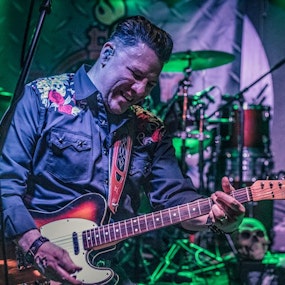
Steve Ramone
A product of the far south side of Chicago, Steve Ramone has been a mainstay in the city’s thriving music scene for almost a decade. His mix of blue-collar, pop-rock-n-roll is informed by the environment in which he grew up, and it is in his music where you’ll have to look for insight into his thoughts and feelings on his upbringing. From the outside Ramone comes off as fun loving and mild-mannered, on stage he’s entertaining, but much more focused and precise – a workman-like demeanor that belies the tradesmen tradition that was ubiquitous in the world he grew up in. The plumbers, carpenters and concrete workers he grew up with play prominent roles in his songs and stories.
Ramone got his start playing in clubs on the East Coast and his hometown of Chicago. The New York punk scene was taking off and moving across the country from East to West. It was a great time to hone skills, develop his songwriting abilities and make the musical relationships he has nurtured into the current incarnation of The Steve Ramone band.
“I was born in a crossfire hurricane. Supposedly the weather was bad.” This kind of vague, mildly plagiaristic response is standard operation procedure for Ramone. He saves the intimate, thought out responses for music and music only. Ask him about his musical childhood and stories of Elvis Presley simulcast from Hawaii come pouring out of him. He can speak endlessly on his summers spent in Puerto Rico and the Salsa, Merengue and Latin Jazz he was exposed to at an early age. Add to that the Beatles, 70’s AM radio and an affinity f… Read More
Featured Episodes
Here are some great episodes to get started with


















